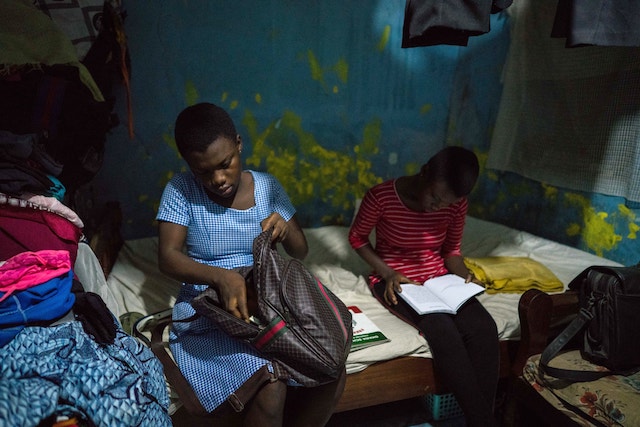|
Getting your Trinity Audio player ready...
|
The education of over 11 million school going girls hang in the balance as they are likely to remain home after the Covid-19 pandemic, according to UNESCO.
This problem, if not dealt with, will worsen the plight of the already existing canker of high number of girls without access to education.
In sub-Saharan Africa, 33.3 million girls of primary and lower secondary school age are out of school. This number rises to 52.2 million when taking into account girls of upper secondary school age, according to a UNESCO Institute for Statistics 2018 report.
Due to the high possibility of girls education being affected if the needed attention is not given, some stakeholders in education are demanding deliberate actions from African governments and decision makers to ensure equal access of education for every girl on the continent as the world marks International Day of the Girl Child.
African Youth Activists have joined UNESCO, the All-Africa Students Union and the 100 Million Campaign, through the “Girls Back to School Campaign” to push for inclusiveness and prioritization of girls to enjoy education to the highest level possible.
This year’s commemoration, under the theme, “My voice, our equal future”, is hinged on reimagining a world led and inspired by young girls.
In an open letter signed by the activists, they expressed concerns over the likelihood of multitude of girls remaining home after the pandemic if African leaders fail to adhere to the call to ensure girls go to school.
The education of girls cannot be overlooked, that is why one of the greatest Pan Africanists, Dr. James Kwegyir Aggrey emphasized that “if you educate a man, you educate an individual, but if you educate a woman, you educate a whole nation”.
Below is the full letter.
Dear African Presidents, Prime Ministers, Governments, Mayors,
We appreciate and respect the actions that you have taken and are taking in response to the COVID-19 pandemic and the impact it is having on millions of lives. We also understand, even though responses might differ from country to country, our collective action as a people will be required to overcome the current challenges to build back better.
On December 19, 2011, the United Nations General Assembly adopted Resolution 66/170 to declare October 11 as the International Day of the Girl Child, to focus attention on the need to address the unique challenges girls face and to promote girls’ empowerment and the fulfilment of their human rights. This year’s commemoration, under the theme, “My voice, our equal future”, is hinged on reimagining a world led and inspired by young girls. Girls deserve an opportunity to be heard and allowed equal access to quality education, proper healthcare systems, skills, recognition and focused investment as leaders of social change.1
The ravaging impact of the pandemic on all sectors of the world’s economy is likely to have a disastrous impact on girls’ education. Already, UNESCO has reported that the COVID-19 pandemic has disrupted the education of over 290 million learners across the world. Statistics from UNESCO suggest that over 11 million girls may not return to school when they reopen. This prediction is unacceptable and is why we, as young activists across the African continent, are coming together through the Girls Back to School Campaign, launched by UNESCO in collaboration with the All-Africa Students Union and the 100 Million Campaign, to demand that learning never stops for every girl despite the challenges posed by the COVID- 19 pandemic.
We have unfortunately witnessed a rise in teenage pregnancies and increased Gender-Based Violence cases during coronavirus induced lockdowns and as the financial impact of the pandemic pushes more families into poverty, cases of early child marriage and child labour are likely to grow. The combined impacts of the aforementioned have the potential to erode all the gains made to ensure gender equality. This cannot be yet another dangerous legacy of COVID-19.
As young activists, we cannot sit aloof and watch all these injustices happen, especially as they will affect the education and futures of these young girls. We understand that, already, schools are beginning to resume in some countries across Africa while some are still maintaining the online modes of pedagogy. We are looking to you to demonstrate leadership in tackling this urgent issue by announcing the concrete measures your office is taking to secure the futures of every girl child by ensuring their access to quality education both now, and when schools resume. Girls facing injustices like the ones mentioned above often suffer in silence, their abuse invisible, by publicly outlining how you are supporting their rights during this turbulent time you can help right this grave wrong.
We look forward to hearing from you, publishing your efforts, or lack thereof, across our network and stand ready to assist however you see fit.
Signed:
Peter Kwasi Kodjie, Secretary General, All-Africa Students Union
Georgia Potton, Head of Activism, 100 Million Campaign
Lungelo Mthethwa, Eswatini
Kupakwashe Chidziva, Zimbabwe
Sofia Najid, Morocco
Catherine Kiama, Kenya
Sosthene Honomou, Guinea
Eyasu Getu Aduna, Ethiopia
Gerard Musabanganji, Burundi
Funny Laskiwe Soko, Malawi
Nakaibale Lynda Eunice, Uganda
Naboth De Celestino, Namibia
Ekemini Inyang, Nigeria
Dorcas Puotiere, Ghana
Dr. Eustache Ndayisaba, Rwanda
Mariam Gamal Amine Geris, Egypt
Steven Kanyakula, Zambia
Cora Elvire, Cameroon
Donga Djelonde Ravie, Congo DR
Trésor Eleacye- Mouele, Congo Brazaville
Zidah Keke Kossiwa Afefa, Ivory Coast
Fatmata Kamara, Sierra Leone
Elizabeth Kinta Gomez, Gambia
Jihad Hassan Mustafa, Sudan
By Josephine Asabea Akonor, Daily Mail GH





